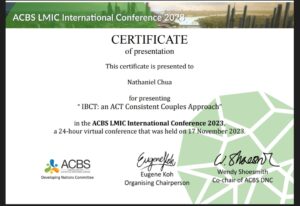Tag: Marriage Counselor
Knowing Your Potential Mate
by Nathan Chua
I am writing this not to advocate for any external form of ritual bonding for couples. I have lately ended up telling my clients that neither am I a priest nor a pastor. I am not here to judge what their lives are and what they’re supposed to do or not. I am duty bound to respect anyone who comes to see me for their important questions about their lives. So it doesn’t matter if you’re monogamous or polyamorous, straight or non-straight, what ends up mattering in our work is if you are living your life according to your best hopes for your short existence.
Now let’s get on with the topic at hand. How many times have you ended up being in a long(er) term relationship with someone who turns out to be totally different from your own images of what a pair bond is supposed to be? Have you ever heard of people who have jumped from one abusive relationship to another? Here are some tips about knowing if you have someone worth considering in front of you:
Be Mindful, Not Blind:
It is understandable that you may have a shortlist of what you want to look for in a partner. This certainly provides greater probability of success than just random choice. Unfortunately, predicting how you and another human being will do in a close relationship is something that the shortlist will never be able to guarantee. What I am saying here is that people are unique and can hardly be summarized in a short checklist. No matter how long this list will be, not one person can match everything that you want.
Getting to know someone is pretty much like learning how to ride a bike, swim, or even walk! There is no instruction manual good enough or long enough to tell you how to do these activities. And so it is with relationships! You won’t really get to know a person thoroughly by just comparing them to a checklist of qualities. Why? Because all behavior happens in context. It’s easy to think about a person’s behavioral choices in a vacuum. We usually do not appreciate the contexts in which these behaviors happen and blindly follow rules that end up with well, blind choices. Your potential mate may be nice in a date, but what are they like in traffic or stressful situations?
There are certainly good reasons why we should trust our minds when it comes to fending off a virus or an infection. But trusting our logical minds to fend off the difficult feelings, thoughts, and memories that we experience in relationships, is a route towards possibly worse outcomes. I often use an example of how our problem-solving minds are an absolute gift. Mosquitoes are some of the worst threats to our health. Without our problem-solving minds, we would not learn to slap them dead on our arms or invent a lotion to repel them. We are quick to apply the same kind of problem-solving skill to our feelings and thoughts. The bad news is there is no slap strong enough to keep your feelings away, nor is there an off lotion version that works to remove our unpleasant internal experiences. If there was, please tell me. Unless it’s some sort of drug or substance that sedates you, then feel free to reach me so I can take these substances myself. I don’t think living a life numbed out or sedated is what I bargained for.
Why is this worth mentioning? Well, in a relationship your logical, sensical mind will tell you that your partner should never arouse any difficult feelings. So, good luck with that if you aren’t mindful enough to notice the rule inside your head. Relationships come with feelings. In fact, you wouldn’t be in a relationship if it meant you were just going to be half awake all the time. You’re there to feel something moving and purposeful. You’re not there for a stale lifeless existence! So be mindful of what you see in your partner in different situations. See if you share the same hopes and cherished values.
Keep in Touch with your Feelings:
As you spend time with a person, you would probably get a sense of what it feels like to be in their company. Do you feel a sense of loneliness? Maybe you are with someone who is preoccupied with themselves; they hardly hear what you have to contribute. Do you feel incensed or angered that this person can’t make a commitment to arrive on time or do as they promise to do? Maybe this person is lacking in empathy and consideration.
If you are one of those who jump from one abusive relationship to another, then maybe it’s time for you to step back and listen to your feelings. Maybe you are so tunnel-visioned into thinking what story your mind is creating about your long term relationship. Maybe it’s time to wake up and check your feelings when you are with this person.
I remember a story of the character of Lt. Dan in the movie Forrest Gump. He, like all of us, created a story of his fate after the Vietnam war. He wanted to die in war just like his war hero ancestors. Just as you and I know, sometimes life happens however. In his case, Gump happened…to save him from his inevitable passing as a war hero. Unable to reconcile his experience with the story his mind wanted to create, he lived his life purposefully wasting his time fighting the memory or thoughts of an opportunity lost with the amputated legs serving as a constant reminder of a missed opportunity to fulfill his mind’s vision of a destiny. In the end, he realized that he can still be the hero unto himself; the one who harbored a hope of living his life without his amputated legs but with much purpose as just Dan, the man, who may not be the war hero he dreamt of becoming, but a person of worth nonetheless.
Just as Lt. Dan started to let go of his grand story of what he wants about his life, maybe you also can hold these love stories lightly, and see if this person is worth your time and love.
Two Shrinks Over Drinks, 15th Anniversary Edition! Interview with Dr. Matthieu Villatte Part 1
Nathan Chua’s Interview on One Balita, March 2024
Nathaniel Chua’s First International Talk Now on the One Life Only YouTube Channel!
Listen to this on Spotify:
Is Your Funny Valentine Still Around? – Video!
Listen to this on Spotify: https://spotifyanchor-web.app.link/e/8savCQtrUGb
Is Your Funny Valentine Still Around?
by Nathan Chua
Having a long term relationship primarily involves two things. Can you guess what they are? The answer could be as simple as acceptance and change. Just like the lines in the Serenity Prayer by Reinhold Niebuhr, a big part of the work I do in individual, couple, and family sessions can actually come to just these two options as people face challenges in their relationships with themselves and their significant others.
I often ask a few questions to my couples once they get to the feedback session, “If you’ve seen a few of those silver or golden anniversary celebrations, what do you notice is usually part of the ceremony? Do you see the couple face each other and say something about their relationship? What do you often see included in their speeches for one another?” After a few guesses and not hearing what I expect them to say, I would add that couples usually talk about the funnier parts of their history together. In fact, couples call each other by their pet names which, especially in Filipino culture, could be endearingly funny. So the answer to the question is humor.
Why is humor important? Because humor signifies a level of acceptance that couples have for each other, knowing that certain things are difficult for them or their partners to change. It also involves a greater awareness of their benign albeit hidden intentions. If one is messier than the other, the neater partner usually only sees a lazy and defensive partner. But once the messier partner feels accepted while the neater partner sees how much the former is trying their best to keep up with the neatness, the human compassionate side starts to kick in. Because like it or not, your partner will probably forget the way you want the stuff on the kitchen counter to be arranged. In other words, it’s not going to be perfect most of the time.
Acceptance:
Let’s first talk about acceptance and why it could be your road to change. Please note though that acceptance is never something that we can demand from each other nor from ourselves. Here’s a quote from Dr. Andrew Christensen et.al.:
“Change is the brother of acceptance, but it is the younger brother. When acceptance comes first, it paves the way for change,” Christensen, Doss, and Jacobson.
It is understandable for couples to come to therapy thinking that they’re there to follow certain rules about how to change their partners or how to change the way they communicate with one another. Anyway, isn’t this the reason why they came to see a trained counselor in the first place? Well, if you find your counselor providing simple solutions to many of your communication problems, then maybe that’s a sign you might have to go elsewhere. Why? Because those very same simple solutions are probably nothing new to what you are already doing. If psychology was done this way then there is no need for its study. All we would need is some good old common sense. For example, simple solutions like making plans for a partner to pick up their socks when they remove their shoes and put them in the hamper. Couples who agree to these types of interventions usually end up fighting about the rules learned in counseling. It can also breed resentment in the partner who is not sided with by the counselor. Moreover, these are new rules to again fight about. Well, one of you is not following the agreement which means another demand and another source of frustration.
It is through acceptance that what we see in our partners as defects turn into the differences they were between you from the very start. Humor is a big part of this process of accepting that your partner will not be your clone. It is also through acceptance that we humans feel moved to change. When others accept us in all our uniqueness, we find the space to feel compassion when we sense that our partner is accepting us even if we snore too loud at night, or cleaning up after us even when they had a long day at work. That compassion is what can trigger more lasting change. It is self-motivated and not coming from an outside expert who probably doesn’t know the full context of your relationship.
Change:
“If we want things to stay as they are, things will have to change.”
― Giuseppe Tomasi di Lampedusa
The change we are looking for, is a change from within. If you go to a counselor and feel like he or she is taking either side of the equation, then that means your counselor is not doing anything that you and your partner haven’t already tried. Your counselor is just adding another voice to either side of the argument. You go home with a full set of rules that are hard to remember in flight and hard to maintain as old habits are difficult to eradicate. In other words, we slip into our old patterns just like all humans do.
Deliberate change can be done in order to avert cumulative annoyance. When I say deliberate it means that the change is coming from a more mindful partner who is capable of seeing the world behind your partner’s eyes. Knowing your partner’s sensitivities and unique history of past relationships with family, friends, ex-romantic partners and many more is your template to doing things more slowly in the face of challenging situations. In fact, if there is indeed a rule that universally applies to any relationship struggling or otherwise, it is simply to slow down and become more mindful or aware of your differences, sensitivities, context, and ways of communicating.
So slow it down and try to get a wider perspective in the heat of the moment. Remember what you wanted to be when you first said yes to the relationship. Can you say yes to the full package and continue to persevere towards your best aspirations you have for yourself in the context of a long term relationship? You can’t slice your partner in half because they come in one package. You only have to remember what you cared about deeply as you jumped into this relationship. Maybe that holds the key and having a good sense of humor about your differences can be one of those endearing things about your partner.
Nathan Chua’s Presentation in November 2023 to an International Group!
On November 17, 2023, Nathan had the privilege of presenting a talk for an international audience of therapists from Low or Middle Income Countries (LMIC) about Integrative Behavioral Couples Therapy. Certificate of Presentation below:

ACBS LMIC International Conference November 2023
Nathaniel Chua, founder of One Life Only Counseling Services will be one of the keynote speakers in this upcoming virtual conference organized by the Association of Contextual Behavioral Science (ACBS) called LMIC (Low or Middle Income Countries) International Conference on November 17, 2023.
He will be speaking about Integrative Behavioral Couples Therapy (IBCT): An ACT (Acceptance and Commitment Therapy) Consistent Approach for Couples.
Click here to know more!

Two Shrinks Over Drinks AGAIN!
In this episode for our series, Shrinks Over Drinks, I talk with Dr. Niklas Torneke, a Swedish psychiatrist who has authored three books in English and more in Swedish. Two of his books in English have been very instrumental in my journey into ACT (Acceptance and Commitment Therapy), RFT (Relational Frame Theory), and behaviorism. He is an authority when it comes to the uses of language and metaphors from an RFT perspective.
I have myself seen how his work has informed me inside the counseling room and how much it helps people see through the veneer of language.
Listen on Spotify!



